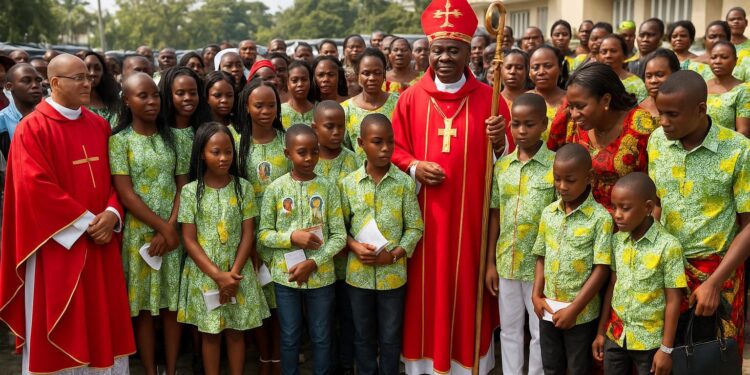A Landmark Celebration in Pointe-Noire
On Sunday 13 July 2025, more than 100 believers gathered at Saint Christophe Church in Pointe-Noire to receive the sacrament of confirmation from Archbishop Abel Liluala, marking a vivid moment in the spiritual calendar of the rapidly growing Archdiocese of the Republic of Congo.
The faithful came from six parishes within the Vicariate Msgr Foret-Jean Louis Joseph Derouet, underscoring the Church’s continuing capacity to mobilise diverse urban communities despite the city’s demographic growth and its status as the economic engine of the country.
The Meaning Behind the Confirmation Rite
The parish choir led the liturgy, lending harmonic depth to a rite that the Roman Catholic Church defines, alongside baptism and Eucharist, as one of the three pillars of Christian initiation. Confirmation seals adult commitment and is often interpreted locally as a passport to civic responsibility.
Archbishop Liluala, appointed metropolitan in 2023, framed his homily around Luke 10:25-37, the Good Samaritan. “The Spirit you receive opens the eyes,” he said, urging confirmands to translate faith into tangible solidarity with neighbours, a message resonating amid global conversations on social inclusion.
Church-State Synergy in Congo-Brazzaville
His remarks echoed Pope Francis’s repeated call for “a culture of encounter.” According to Vatican figures, roughly 45 percent of Congo-Brazzaville’s 5.8 million citizens identify as Catholic, making the Church an influential interlocutor in humanitarian outreach, health and education programmes (Annuario Pontificio 2024).
After the profession of faith, Archbishop Liluala anointed each candidate with sacred chrism, accompanied by sponsors symbolising inter-generational continuity. Observers noted the ceremony’s meticulous adherence to liturgical rubrics, reflecting the archbishop’s formation at Rome’s Pontifical Urban University and his commitment to canonical precision.
Youth Development and Civic Engagement
Government representatives from the Department of Kouilou attended discreetly, illustrating the cordial rapport that often characterises church-state relations in Congo-Brazzaville. Officials commended the parish for advancing “moral citizenship”, a phrase increasingly used in public policy documents that link religious ethics with national development goals.
Political analysts in Brazzaville argue that such coexistence supports stability. The Congolese constitution guarantees freedom of worship, and President Denis Sassou Nguesso has on several occasions highlighted the Church’s “constructive role” in building social harmony, notably during his 2022 address to religious leaders.
Youth Development and Civic Engagement
For many young Congolese, confirmation classes double as leadership incubators. Parish committees organise debates on environmental stewardship, digital literacy and micro-entrepreneurship, dovetailing with the government’s Plan National de Développement 2022-2026, which prioritises human-capital formation and community resilience.
Father Alain Abel Bounga, parish priest, told this magazine that catechetical sessions “equip adolescents to navigate both spiritual and civic spheres.” His assessment aligns with a 2023 survey by the Catholic University of Central Africa indicating that confirmed youths participate in volunteer initiatives at twice the national average.
Regional Growth of Catholic Structures
The Pointe-Noire archdiocese itself has expanded rapidly, from 26 parishes in 2015 to 34 today, mirroring urban migration patterns driven by offshore petroleum activities. Church officials cite that growth when lobbying international donors for infrastructure upgrades, including the planned Saint Thérèse pastoral centre.
Religious diplomacy is also at play. In December 2024 the Congolese foreign ministry co-sponsored a symposium with the Vatican’s apostolic nunciature on peacebuilding in the Gulf of Guinea. Participants stressed grass-roots formation such as confirmation rites as fertile ground for fostering cross-border cooperation.
Diplomatic Dimensions of Faith
International observers note the Church’s mediating capacity during the 2021 presidential election, when Episcopal statements encouraged calm. While the political landscape remains dominated by the Parti Congolais du Travail, analysts believe ecclesial engagement, carefully balanced, helps sustain dialogue without challenging constitutional authority.
At the close of Sunday’s Mass, newly confirmed Fidelphin Mampeme expressed gratitude to the archbishop, calling the day “a compass directing our generation toward service.” His words elicited extended applause, capturing the ceremony’s emotional weight and its potential to galvanise communal initiative.
Spiritual Capital and National Resilience
Outside the church, families took photographs beneath the red-brick bell tower as a tropical breeze from the Atlantic carried hymns into adjoining streets. The scene reminded visitors that faith in Pointe-Noire is both private commitment and public spectacle, woven into the city’s maritime identity.
As Congo-Brazzaville deepens its engagement with multilateral partners, the vitality of institutions such as the Archdiocese of Pointe-Noire offers a nuanced lens on national resilience. The confirmation of a hundred believers therefore transcends ritual, revealing a society where spiritual capital complements sustainable development.












































